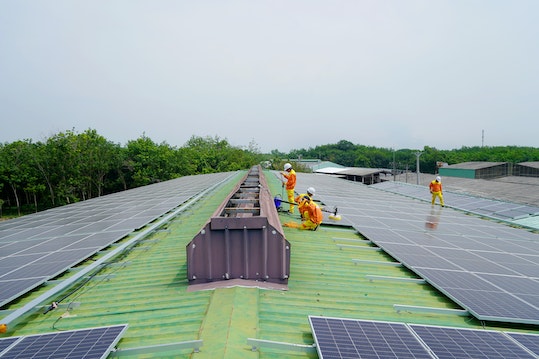
In an era where sustainability and environmental consciousness have taken center stage, the adoption of renewable energy sources has become imperative. Among these sources, solar energy shines as a beacon of hope for a sustainable future. Solar power not only offers a clean, abundant, and inexhaustible energy source but also has the potential to revolutionize the way we power our world. In this blog, we will delve into the world of solar energy, exploring its benefits, challenges, and the promising future it holds.
The Basics of Solar Energy
At its core, solar energy is harnessed from the sun’s radiant light and heat. This energy can be converted into electricity using photovoltaic (PV) cells or utilized directly as thermal energy for heating and cooling applications. The fundamental principle behind solar power is simple: when sunlight hits a solar panel, it excites electrons within the PV cells, generating an electrical current.
The Advantages of Solar Energy
- Clean and Renewable: Solar energy is a clean and renewable resource, meaning it doesn’t produce harmful emissions and won’t run out as long as the sun continues to shine.
- Reduced Electricity Bills: By generating your own electricity through solar panels, you can significantly reduce your electricity bills, providing long-term financial benefits.
- Low Maintenance: Solar panels are relatively low-maintenance and have a lifespan of 25 years or more. Routine cleaning and occasional inspections are typically all that’s needed.
- Energy Independence: Solar power allows homeowners and businesses to become more self-reliant when it comes to their energy needs, reducing reliance on external sources and the grid.
- Job Creation: The solar industry has been a significant driver of job creation, offering employment opportunities in manufacturing, installation, maintenance, and research and development.
Challenges and Solutions
While solar energy offers numerous advantages, it’s not without its challenges:
- Intermittency: Solar power generation depends on sunlight, making it intermittent. However, advancements in energy storage solutions, like batteries, are addressing this challenge by allowing excess energy to be stored for later use.
- High Initial Costs: The upfront cost of installing solar panels can be a barrier for some individuals and businesses. Government incentives, tax credits, and financing options are helping make solar more accessible.
- Energy Conversion Efficiency: Improving the efficiency of solar panels remains a priority. Researchers are continually working on new materials and technologies to increase the conversion efficiency of PV cells.
The Bright Future of Solar Energy
The future of solar energy is brighter than ever, with several exciting developments on the horizon:
- Increased Efficiency: Ongoing research into advanced materials and solar cell technologies is expected to boost the efficiency of solar panels, making them even more cost-effective.
- Energy Storage: As energy storage solutions become more affordable and efficient, solar power will become a more reliable and consistent energy source, even during cloudy days or at night.
- Smart Grid Integration: Integration with smart grids will enable better management of solar power, allowing for more efficient distribution and utilization of electricity.
- Solar in Space: Space-based solar power systems, capturing energy directly from the sun without atmospheric interference, hold great promise for providing clean energy to remote or high-demand locations on Earth.
- Solar Farms: Large-scale solar farms and solar parks are becoming more common, contributing significant amounts of electricity to the grid and reducing reliance on fossil fuels.